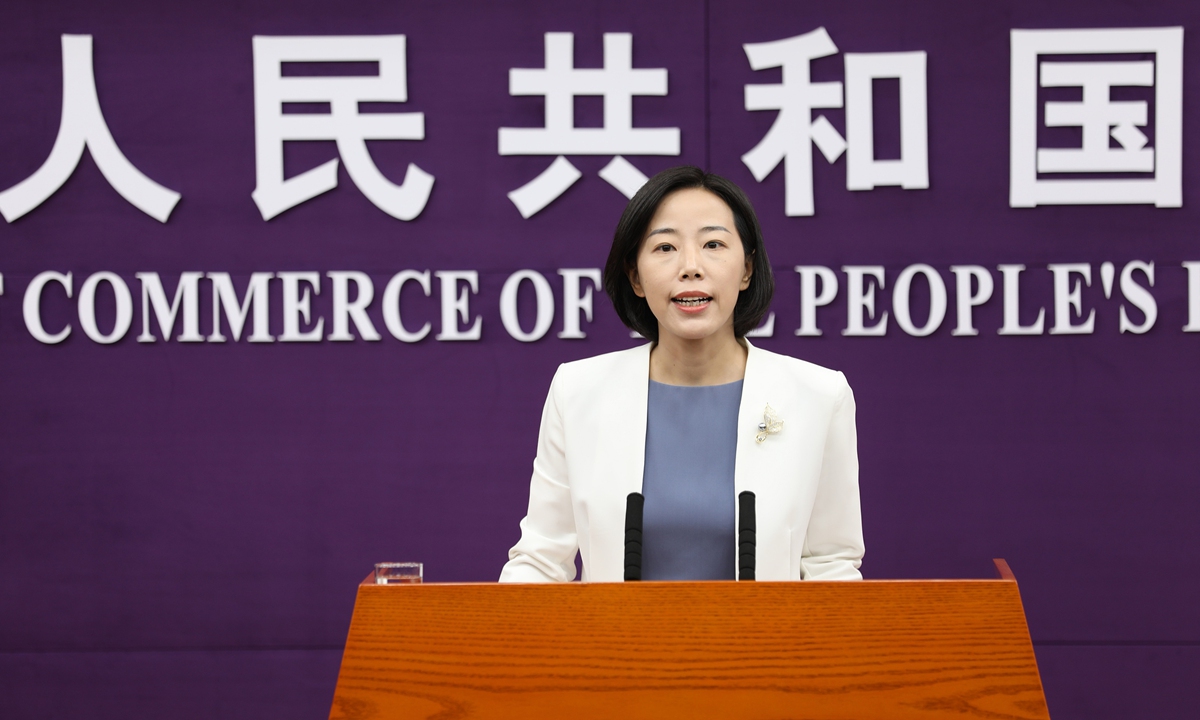China's services trade fair becomes 'golden business card' to expand industry and opening-up cooperation: MOFCOM

Photo: Ministry of Commerce (MOFCOM) spokesperson, Shu Jueting
China's annual services trade fair, which is to be held in early September, has become a "golden business card" for the expanding services industry and trade after 11 years' development, China's Ministry of Commerce (MOFCOM) said on Thursday, highlighting that the fair has a big significance for China's high-level opening-up and global recovery.
China's services trade has kept an upward trend in the first half of this year, despite facing a complex external environment, Shu Jueting, spokesperson of MOFCOM, said, attributing the growth to the continuous effect of the support policies, and a more solid foundation laid by the continuous recovery of China's economy.
Shu said that more than 200 countries and regions conduct trade in services with China amid the deepened international cooperation, and China has signed memorandums in services trade with 15 countries, which shows that the "friend circle" is expanding.
"The services trade fair has become the 'golden business card' for China to expand its services industry and its opening-up in services trade after 11 years of development," Shu said.
The 2023 China International Fair for Trade in Services (CIFTIS) will be held in Beijing from September 2 to 6. The fair has attracted more than 600,000 exhibitors from 196 countries and regions and more than 600 overseas business associations and institutions participating since it was launched in 2012. It has become the largest comprehensive exhibition in the field of global services trade and an international public good of global services industry.
China is not only a big manufacturing country, but also a country with many opportunities in the services industry given a population of 1.4 billion, Bai Ming, a research fellow at the Chinese Academy of International Trade and Economic Cooperation under MOFCOM, told the Global Times on Thursday.
We not only export the services but also attract services from other countries, which means we can optimize the allocation of global resources in the services field, Bai added.
The event will help demonstrate China's confidence in unswervingly promoting high-level opening-up to the world, attracting global resources and elements to accelerate the construction of a new development pattern, and promoting the recovery of the world economy by joining hands with other countries, Zhang Yi, deputy head of China Center of International Economic Exchanges, said at the press conference of the fair on Sunday.
The event will have nine sections including telecommunications, financial services and environmental services. It will also bring smart services and achievements in innovation by displaying new technologies and applications such as in artificial intelligence.
Schneider Electric will launch upgraded service systems, including EcoConsult, EcoCare and EcoFit. By building end-to-end full lifecycle service capabilities and collaborating with service partners, it will help customers to accelerate the digital and green transformation, promoting high-quality and sustainable development, according to the information shared with the Global Times.
Data from MOFCOM showed that China's trade in services maintained a steady growth in the first half of this year, with the total imports and exports of services reaching 3.14 trillion yuan ($431 billion), a year-on-year growth of 8.5 percent.
Among them, knowledge-intensive services trade accounted for 43.5 percent, an increase of 1.5 percentage points from the previous year, and the imports and exports of travel-related services increased by 65.4 percent, which is the fastest growing services trade field.
Since the beginning of this year, the services industry has maintained rapid growth. In the first half of the year, the added-value of the services industry was 33 trillion yuan, a year-on-year increase of 6.4 percent, accounting for 56 percent of the GDP, 1.6 percentage points higher than the same period of the previous year, and a contribution rate of 66.1 percent to the growth of the national economy.



